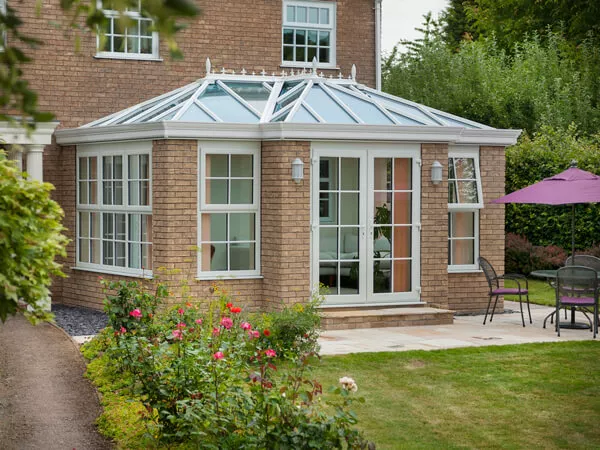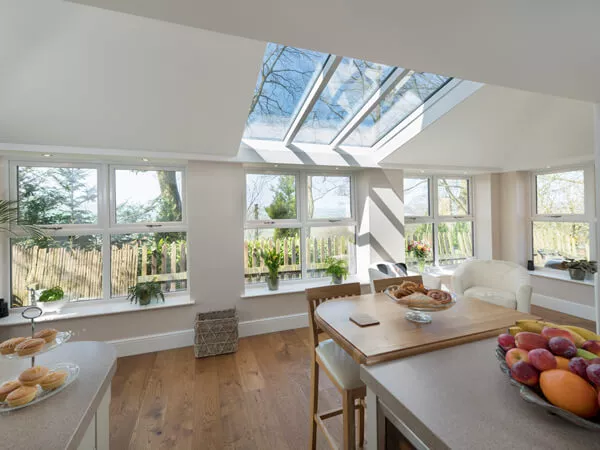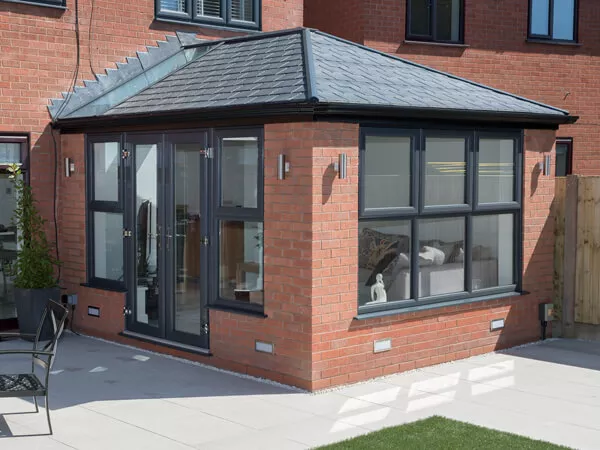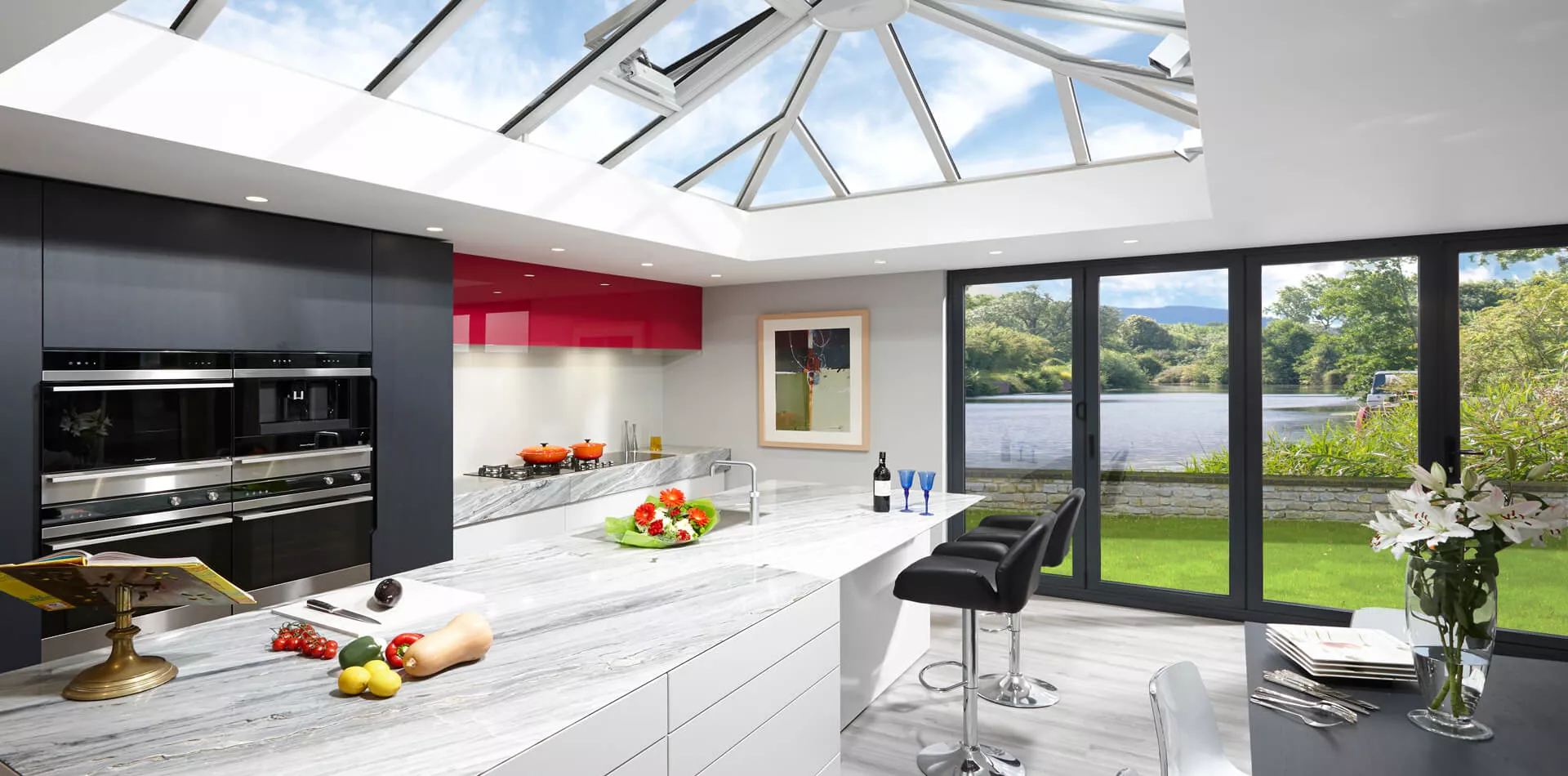What's the difference between a conservatory, orangery and an extension?
This is a great question and one we get asked constantly! The answer isn’t black and white because the lines have been blurred in modern times. At Eden, your living space can be anything you want it to be and it doesn’t have to fit into a box or within a label. Traditionally, a conservatory is predominantly glass including a glass roof that gives you a view above. However, you can still choose to have a tiled roof conservatory if you are concerned about using your living space during winter. We also have the option of solar control glazing to control the temperature.
Traditionally, an orangery involves more brickwork. The bricks or aluminium pillars add to the privacy and warmth of this popular type of living space, as it gives it a feeling of luxury. Often, they include a pelmet around the roof of the structure to add even more thermal insulation. Our customers have a variety of roof types to choose from, including solid tiles roofs or a glass lantern roof.

When it comes to extensions, they are often manufactured to look like a seamless part of the home, designed in a similar style to the existing building. Extensions may feature a solid tiled roof but they could also be a hybrid roof by including full length glass panels and/or Velux windows for added light and ventilation.
Don’t get too distracted by the different labels! One of our friendly Eden advisors can help create something totally personalised to you and your needs.

Should I choose a tiled roof or a glass roof?
This depends on a number of factors. You should consider your budget, the purpose of your living space and which direction it faces. You may be leaning towards a glass roof because you would like a stunning view of the sky above. Fortunately, you don’t need to worry about your living space overheating because of our smart glazing options.
If you want a true year-round extension, it makes sense to consider a solid tiled roof. We can add full length glass panels or Velux windows to create a hybrid roof with the best of both worlds.
An Eden advisor can advise you on the perfect option for your needs and budget.

MORE COMMON QUESTIONS
Please don’t hesitate to speak to our Eden advisors to clarify any information you find on our website. We have added a list of common questions below.
Will it be too hot in summer and too cool in winter?
No. We have designed our living spaces to be used comfortably all year so you don’t have to worry about overheating in summer and being too cold in winter. We use solar control glazing to combat this to ensure you can make the most out of your living space. Still concerned? When choosing your roof type, opt for a tiled roof for a truly year-round extension.
Do you manufacture your own roofs?
Yes we do! Eden is part of the Conservatory Outlet Group of companies and its sister company Conservatory Outlet is one of the top manufacturers of roof products in the UK. Our roofs are manufactured here in the UK at Conservatory Outlet’s manufacturing facility in West Yorkshire.
We are proud to have such a strong relationship with our manufacturer as that means we have control over the supply chain and ultimately, the quality of our products.
Can I choose different roof tiles to match my home?
Yes, that is not a problem. We have a wide range of shingle and slate roof tile options, as well as flat roof membranes. We are also happy to match the roof tiles on your current home to the new living space roof. Please ask for more information.
What does 'A' rated windows mean?
You may have heard a lot about energy rated windows. If windows are rated A, they have been awarded the highest rating and are extremely energy efficient. This rating system has been defined by BFRC Rating Scheme, the UK’s national system for rating energy efficiency of windows.
The rating was devised to be simple to understand, with traffic-light style A-E ratings used. This isn’t too dissimilar from what you would see on ‘white’ items you have in your home, such as fridges, freezers and washing machines.
Use these ratings to make knowledgeable choices when looking into buying new windows. Energy efficient windows can save you money month after month.
What is solar control glazing?
Solar control glazing controls the amount of heat that is transmitted into your home, preventing your space from overheating. It also prevents your internal heat escaping. Solar control glazing has a clever coating on the glass which would keep your living space a comfortable temperature all year long. We can talk you through our many tinting options for different degrees of light transmission and heat retention based on your requirements.
Can you match the new bricks to my existing bricks?
We will always do our best to find the closest match if this is important to you and we will run the options by you before we start building your new installation. Please be aware that there could be weathering and manufacturing alterations between the current and new bricks. If our closest match is not suitable, we can tint your new brickwork for an even closer match. This comes at an additional cost.
Do I need Building Regulations Approval?
It is likely that you will need approval under Building Regulations for your new extension. However, there are many classes of extensions that don’t need approval. Eden can send a surveyor to determine whether you need this and let you know of your options. If needed, we will also arrange Building Regulations for you by speaking with the relevant local authority.
Do I need planning permission?
An extension or addition to your house is considered to be permitted development, not requiring an application for planning permission, subject to certain conditions are met, typically these are:
- The ground area covered by the extension and any other buildings within the boundary of the property, excluding the original house, is not more than half the total area of the property.
- Any part of the extension is not higher than the highest part of the roof of the existing house.
- The eaves of the extension are not higher than the eaves of the existing house.
- Any part of the extension does not extend beyond any wall facing a road if it forms the principal or side elevation of the original house.
- The eaves are no more than 3 metres in height if any part of the extension is within 2 metres of the property boundary.
- The materials used in exterior work, except in the case of a conservatory, are of similar appearance to the existing house.
- An upper floor window on a side elevation within 15 metres of a boundary with another house is obscure glazed; and is non – opening unless the parts which can be opened are more than 1.7 metres above the floor of the room in which the window is installed.
- A side extension does not exceed 4 metres in height or be wider than half the width of the original house.
- In a single storey extension
- the extension does not extend beyond the rear wall of the original house by more than 4 metres for a detached house or 3 metres for any other type of house;
- the height of the extension does not exceed 4 metres;
- no part of the extension is within 3.5 metres of any property boundary with a road opposite the rear wall of the house.
- In an extension with more than one storey
- the extension does not extend beyond the rear wall of the original house by more than 3 metres;
- no part of the extension is within 7 metres of the property boundary opposite the rear wall of the house;
- the roof pitch of the enlargement is as far as practicable the same as that of the original house.
- If you live in a house within a conservation area, World Heritage Site, area of outstanding natural beauty or National Park-
- no part of the exterior of the house is clad with stone, artificial stone, pebbledash, render, timber, plastic or tiles;
- the extension is not more than 1 storey or 4 metres in height;
- no part of the extension extends beyond a principal or side elevation of the original house
How long will it take to build my new living space?
Unfortunately, we cannot give you a definite answer at this stage. The time it takes to build a living space depends on a number of factors, including but limited to planning requirements and the complexity of the job. Ask an Eden advisor for our guide, ‘What happens next’, for a rough idea of timings.
What is a test dig?
A test dig checks that local ground conditions are able to withstand a traditional concrete base and foundation. If the ground is not suitable, we can guide you through alternatives. This could be a specialist pile foundation or concrete raft.
What is the purpose of a cavity tray?
A cavity tray is important because it has the crucial job of stopping moisture from appearing in your new extension after penetrating the outer wall. It is a series of high level damp proof courses that bridge a wall cavity to direct moisture to the external face of a wall, which is where the extension roof joins the house wall.
FINANCING YOUR PURCHASE
Eden, believes that you shouldn’t have to pinch your pockets to be able to purchase our products. You can pay in affordable monthly instalments to better suit your needs and budget.
FINANCING YOUR PURCHASE
Eden, believes that you shouldn’t have to pinch your pockets to be able to purchase our products. You can pay in affordable monthly instalments to better suit your needs and budget.
NEED MORE ANSWERS?
Simply fill in your details below and one of our customer advisors will get in touch to answer any of your questions.



